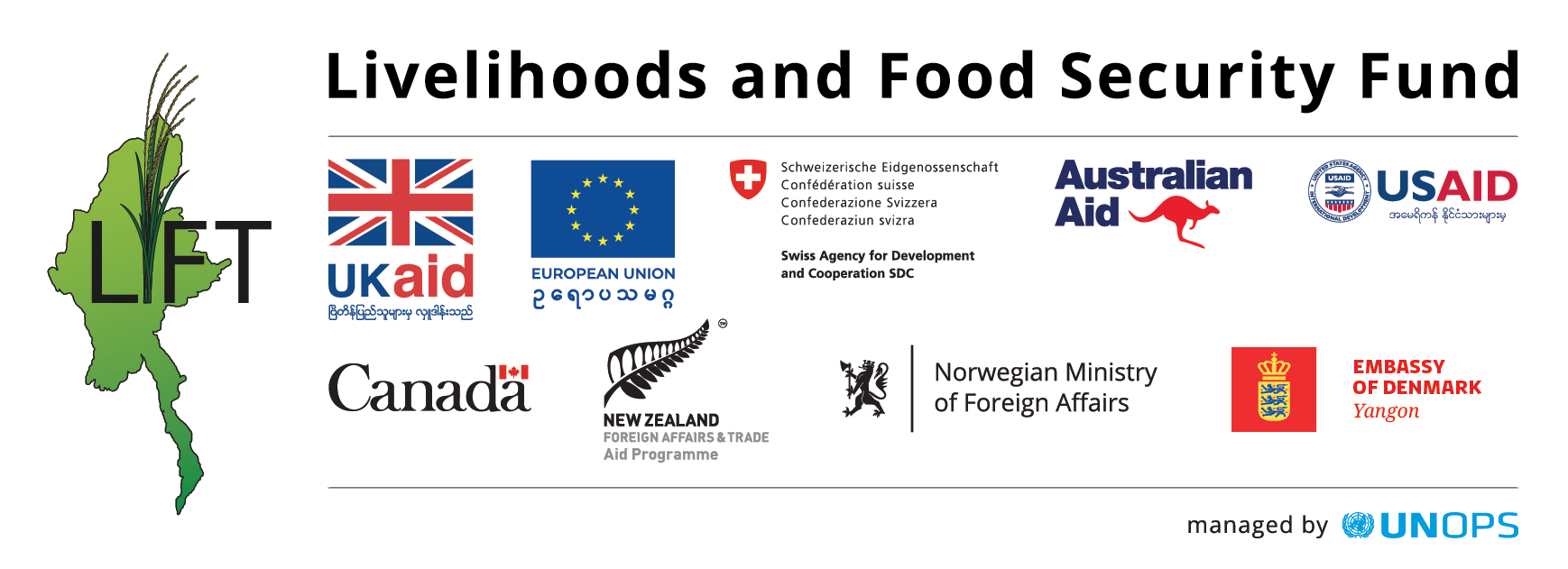
Chin is the poorest state in Myanmar and it has a low population density with limited infrastructure development. This has contributed to a lack of agricultural development and market integration, along with significant out-migration as a result of limited opportunities to diversify livelihoods. The poor agricultural production and low income affect the nutritional status of the population, especially that of women and children.
LIFT has been investing in Chin State since 2015 and is currently starting a new programme to strengthen the resilience and sustainable livelihoods of poor and vulnerable groups. Catholic Relief Services (CRS) partnering with Karuna Mission Social Solidarity (KMSS) are important partners for LIFT in Chin State, promoting nutrition-sensitive agriculture to address the challenges facing households and communities with respect to sound dietary knowledge and consumption.
The “Production Agriculture through Community Engagement (PACE)” project implemented by CRS and KMSS operates in 60 villages in Falam, Thantlang and Matupi (Rezua Sub-Township) Townships in Chin State. PACE teaches small-holder farmers improved agronomic practices for nutrition-sensitive crops, including maize and beans, and teaches them about diversified home gardens, and essential nutrition and hygiene actions for mothers in the first 1,000 days.
In the wake of the COVID-19 pandemic, CRS developed an emergency plan to help prevent the virus in the PACE project areas. Pivoting existing project funding, CRS has carried out COVID-19 response activities in villages, distributing prevention items and IEC material, such as non-contact thermometers, soap and hand sanitiser, hand-washing facilities and masks. Their support has reached a total of 17,115 beneficiaries (8,403 female and 8,712 male).
In the context of COVID-19, home-based production systems can form part of a coping and resilience strategy when supply chains are broken. The prolonged presence and deep knowledge of the context and communities allow CRS/KMSS to support Chin State with COVID-19 preparedness activities, paving the road for a longer-term resilience building response.
--------------------------------------------------------------------------------
(in Myanmar language)
ချင်းပြည်နယ်သည် မြန်မာနိုင်ငံရှိ ဖွံ့ဖြိုးမှုနောက်အကျဆုံးပြည်နယ်တခုဖြစ်ပြီး လူနေသိပ်သည်းမှုလည်း နည်းပါးကာ အခြေခံအဆောက်အဦများမှာလည်း အကန့်အသတ်ဖြင့်သာ ရှိနေပါသည်။ ၎င်းအခြေအနေ များကြောင့် စိုက်ပျိုးရေးဖွံ့ဖြိုးတိုးတက်မှု နှင့် ဈေးကွက်ပေါင်းစည်းနိုင်မှုမရှိခြင်းအပြင် အသက်မွေးမှုလုပ်ငန်း အမျိုးမျိုးအတွက် အခွင့်အလမ်းနည်းပါးသည်လည်းဖြစ်ရာ ပြည်ပသို့ရွှေ့ပြောင်းလုပ်ကိုင်ကြခြင်းများလည်း ရှိပါသည်။ စိုက်ပျိုးထွက်ကုန်နည်းပါးခြင်းနှင့် ဝင်ငွေနည်းခြင်းများသည် ဒေသခံလူထု အထူးသဖြင့် အမျိုးသမီးများနှင့် ကလေးများ၏ အာဟာရရှရှိမှုအနေအထားအပေါ်တွင် သက်ရောက်မှုများ ရှိနေသည်။
LIFT သည် ချင်းပြည်နယ်တွင် ၂ဝ၁၅ခုနှစ်မှစ၍ ရန်ပုံငွေများပံ့ပိုးဆောင်ရွက်ခဲ့ပြီး လက်ရှိအချိန်တွင်လည်း စီမံကိန်းအသစ်တခုကို စတင်ရန် ဆောင်ရွက်နေပါသည်။ ထိုစီမံကိန်းသည် နွမ်းပါးသူများနှင့် ထိခိုက်လွယ်သူများ၏ အသက်မွေးမှုများ ရေရှည်ဖြစ်ထွန်းနိုင်ရန် နှင့် ကြံ့ကြံ့ခံနိုင်မှုစွမ်းရည်များ ပိုမိုအားကောင်းလာစေရန် ရည်ရွယ်ပါသည်။ ချင်းပြည်နယ်ရှိ Catholic Relief Services (CRS) နှင့် Karuna Mission Social Solidarity (KMSS) တို့သည် LIFT ၏ အရေးပါသော မိတ်ဖက်အဖွဲ့အစည်းများဖြစ်ကြပြီး အိမ်ထောင်စုများနှင့် ရပ်ရွာလူထုများရင်ဆိုင်နေရသော ပြည့်စုံမှန်ကန်သော အာဟာရဆိုင်ရာ ဗဟုသုတရရှိမှုနှင့် စားသုံးမှုပုံစံ အခက်အခဲများနှင့် ပတ်သက်ပြီး ဖြေရှင်းနိုင်မည့် အာဟာရဇောင်းပေးစိုက်ပျိုးရေးကဏ္ဍကို မြှင့်တင်ဆောင်ရွက်လျက်ရှိပါသည်။
CRS နှင့် KMSS တို့လက်တွဲအကောင်ထည်ဖော်သည့် ‘Production Agriculture through Community Engagement (PACE) - ရပ်ရွာလူထုပူးပေါင်းပါဝင်မှုဖြင့် စိုက်ပျိုးထုတ်လုပ်မှု စီမံချက်’ကို ချင်းပြည်နယ် ဖလမ်း၊ ထန်တလန် နှင့် မတူပီ (ရေဇာ မြို့နယ်ခွဲ) မြို့နယ်များရှိ ကျေးရွာပေါင်း ၆ဝတွင် ဆောင်ရွက်နေပါသည်။ PACE စီမံချက်သည် လုပ်ကွက်ငယ်တောင်သူများကို ပြောင်း နှင့်ပဲအပါအဝင် အာဟာရဇောင်းပေးသည့် သီးနှံများ အတွက် သီးနှံသစ်တောရောနှောစိုက်ပျိုးသည့် နည်းလမ်းကောင်းများကို သင်ကြားပေးကာ အိမ်ခြံခင်း အမျိုးမျိုးစိုက်ပျိုးနိုင်ရန်လည်း လမ်းပြပေးပါသည်။ စီမံချက်သည် ရက်ပေါင်း ၁ဝဝဝ ကာလအတွင်းရှိ မိခင်များအတွက် အာဟာရ၊ တကိုယ်ရေသန့်ရှင်းရေးတို့နှင့်ပတ်သက်၍ မဖြစ်မနေလိုက်နာ ဆောင်ရွက်သင့်သည့် အချက်များကိုလည်း ပေးအပ်လျက်ရှိသည်။
COVID-19 ကပ်ရောဂါသက်ရောက်မှုကြောင့် PACE စီမံချက်ဒေသများတွင် ဗိုင်းရပ်စ်ပြန့်နှံမှုကို ကာကွယ်ရန် အတွက် အရေးပေါ်လုပ်ငန်းစီမံချက်တခုကို CRS က ရေးဆွဲခဲ့ပါသည်။ လက်ဆေးစင်များ၊ နှာခေါင်းစည်းများ၊ လက်သန့်စင်ဆေးရည်၊ ဆပ်ပြာ၊ သာမိုမီတာ စသည့် အကာအကွယ်ပစ္စည်းများ နှင့် အသိပညာပေးစာစောင် များ ဖြန့်ဝေခြင်းကို COVID-19 တုံ့ပြန်ရေး လုပ်ငန်းများအဖြစ် လက်ရှိဆောင်ရွက်ဆဲ စီမံချက် ဘတ်ဂျက်ကို အသုံးပြုပြီး ကျေးရွာများတွင် ဆောင်ရွက်ခဲ့ပါသည်။ ထိုဆောင်ရွက်မှုသည် စီမံချက်ဝင် လူပေါင်း ၁၇,၁၁၅ ဦး (အမျိုးသမီး ၈,၄ဝ၃ ဦး၊ အမျိုးသား ၈,၇၁၂ဦး) ကို ပံ့ပိုးနိုင်ခဲ့သည်။
COVID-19 ကာလတွင် ကုန်စည်စီးဆင်းမှုများ ပြတ်တောက်သည်ဖြစ်ရာ အိမ်တွင်းအခြေပြုထုတ်လုပ်မှုပုံစံသည် အကျပ်အတည်းကို ရင်ဆိုင်နိုင်သည့် အနေအထားတခုကို ပေးပါသည်။ CRS နှင့် KMSS တို့၏ ကာလရှည်ကြာ ဖွံဖြိုးရေးလုပ်ငန်းများဆောင်ရွက်နေမှု နှင့် ဒေသအခြေအနေကို ကောင်းစွာနားလည်မှုတို့သည် ချင်းပြည်နယ် တွင် COVID-19 အရေးပေါ်လုပ်ငန်းများဆောင်ရွက်ရာတွင် အထောက်အကူများစွာဖြစ်စေမည်ဖြစ်ပြီး ကြံ့ကြံ့ခံနိုင်မှုကို ကာလရှည်ကြာ တည်ဆောက်နိုင်မှုအတွက်လည်း လမ်းကြောင်းဖြစ်ထွန်းစေမည် ဖြစ်ပါသည်။


